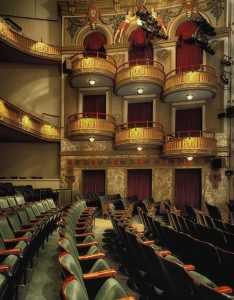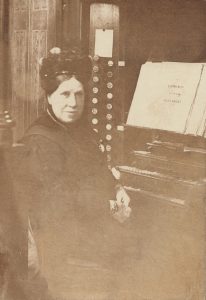A series of five Blogs discussing the literary component of
the story of Judith found in the Apocrypha in light of composer
Alexander Serov’s own professed expectations for opera,
to determine what may be considered quintessentially
Russian about his first opera, Judith.
A Russian Judith? Literary Reflections on
Alexander Nikolayevich Serov’s First Opera
Part 3
The Irony of Judith
As a music critic engaged in journalism, Serov was well-versed in the use of irony, both in his own writings and in the writings of others. Although privately disappointed in Glinka’s Ruslan and Lyudmilla for its failure to lay the foundation for Russian nationalist dramatic music, Serov refrained from venting his criticism publicly, lest the cause of securing equal rights for Russian opera be jeopardized. 1 Yet when the opera was revived a year after Glinka’s death, Serov reversed his stance, showing no mercy in his vindictive prose. 2
Ironically, Serov’s strategy backfired. By dismissing Ruslan and Lyudmilla in comparison to Wagner’s operas not yet known in Russia, Serov antagonized the nationalist sentiment upheld by Stasov, among others. In a calculated reversal of support, Serov’s position was attacked vociferously, while Ruslan and Lyudmilla was cast in a patriotic persona on the exalted level of a Shakespearean drama. 3 Serov continued to espouse a realist position that viewed nationalist coloration, reflected in the orientalism of Ruslan and Lyudmilla, at odds with dramatic strength and unity. 4
Serov, who was proud of his German-Jewish heritage, chose the biblical story of Judith in which to apply his principles of musical dramaturgy in Russian opera. Admitting to librettist Konstantin Zvantsev that he always had been attracted by stories and characters of the Old Testament (although the origin of Judith is apocryphal), Serov likely would have recognize the literary and musical potential that the source’s dramatic ironies had for realistic operatic treatment. 5
Realism in nineteenth-century Russian art and literature was regarded as a specific objective form of mirroring reality. In the works of the literary masters of the time, such as Alexander Pushkin, Nikolai Gogol and Fyodor Dostoevsky, life is portrayed as faithfully as they knew it, with an eye to humanity’s great problems of good and evil, life and death. 6 Unlike romanticism, literary realism always comes back to things of this world. 7 Protagonists are often ineffective weak men and strong-minded women whose prototypes are found in Pushkin’s Eugene Onegin. Moral and philosophical problems are stressed in works that are strikingly ethical in their veracious portrayal of real life. 8
The dramatic irony of Russian realism is reflected in the remarkable contrasts and contradictions that pervade the story of Judith, both in its characters and in its plot. The biblical tale pits good against evil in the characters of Judith and Holofernes, respectively. Morality is emphasized in the victory of the besieged Israelites over their Assyrian oppressors. The underlying message about the power of faith has vague emotional resonance to the Russian political situation that systematically suppressed the freedoms of its peasants in favor of the landed gentry.
Contradictions are evident in the actions of the story’s two main characters. Holofernes, the powerful, seasoned commander who headed over 130,000 warriors, literally loses his head to an ultra-devout Jewish woman who lives a life of constant prayer and fasting, yet, clever and ruthless in her scheming, seemingly has no qualms about murdering for the sake of her people.
Serov’s avowed intent to adhere faithfully to the biblical version of the story in his opera Judith reflects his concern for the three components of serious opera: text, music, and staging. Although the weighting of the three elements might shift, the absence of any one of the components negates the concept of opera. The importance Serov placed on the first component involving content and idea of the opera as a play led him to distinguish three stages in the text of the opera: plot, scenario, and words. The first stage, the plot, was the most important in relation to the opera as a dramatic composition and theatrical presentation and with regard to music. 9 As Serov explained:
On the first stage depends the ability of the text to “inspire” the musician; on this same factor, together with the music and production, depends the interest and attraction of the opera and its whole fate. […]
For the listener, the words in most cases disappear behind the music, drown in an ocean of vocal and instrumental sounds. In keeping with this inescapable evil, the libretto of an opera must be so made that the plot in its broad outlines be consistently clear and understandable almost without the assistance of words; that it be almost as simple and graphic as that of a ballet. 10
That the libretto for Serov’s Judith follows the biblical account as closely as it does is surprising given the number of people involved in its construction. Although Serov originally had conceived Judith as an Italian opera, he settled on a Russian opera when the Italian prima donna whom he hoped to favor with the role of Judith dismissed the work. 11 Zvantsev translated Giustiniani’s original text into Russian but left the libretto unfinished. When Serov’s plan to write his own libretto in Wagnerian fashion fell short of completion, he employed the services of Dmitry Lobanov and Apollon Maykov, whom Edward Garden dubs “a number of hacks and one genuine poet,” as versifiers. 12 The finished product was a libretto whose text followed the Judith narrative as found in the Bible/Apocrypha, but with some changes, the significance of which becomes apparent on closer examination.
Continued in Part 4 The Opera Judith
For more about the role of the nurse character in Serov’s Judith, see Judith Barger, The Nurse in History and Opera: From Servant to Sister (Lexington Books, May 2024).
Notes
- [Muzkal’noe nasledstvo I, 130; cited in Richard Taruskin, Opera and Drama as Preached and Practiced in the 1860s, Russian Music Studies No. 2 (Ann Arbor, MI: UMI Research Press, 1981), 14.
- Alexander N. Serov, Kriticheskie stat’i II (Saint Petersburg, 1892), 1019–26; cited in Taruskin, Opera and Drama, 19–20.
- See Taruskin, Opera and Drama, 19–20.
- Izbrannye stat’i II, 280; cited in Taruskin, Opera and Drama, 15.
- Konstantin I. Zvantsev, ‘Vospominaniia ob. A.N. Serove I pis’ma ego’, Russkaia starina 59 (1888), 378; cited in Taruskin, Opera and Drama, 44.
- Ernest J. Simmons, Introduction to Russian Realism (Bloomington: Indiana University Press, 1965), 97.
- Franklin D. Reeve, The Russian Novel (New York: McGraw-Hill, 1966), 49.
- Reeve, Russian Novel, 98, also 10–11.
- Serov, Izbrannye stat’i I, 255; cited in Taruskin, Opera and Drama, 49–50.
- Serov, Izbrannye stat’I I, 258; cited in Taruskin, Opera and Drama, 50.
- Alexander N. Serov, “Autobiographical Sketch,” Izbrannye stat’i I, 73; cited in Taruskin, Opera and Drama, 51.
- Edward Garden, ‘Serov, Alexander Nikolayevich’, in New Grove Dictionary of Music and Musicians, ed. Stanley Sadie, vol. 18 (London: Macmillan, 1980), 179.



